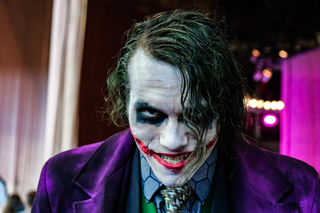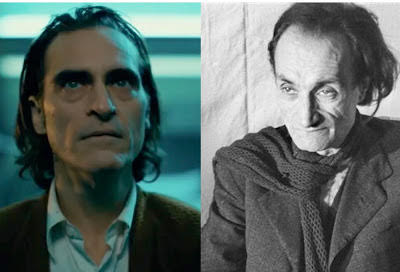Michael Hoffman - The Joker is a Work of Art
October 8, 2019

The "Joker" movie of October 2019 is disenchanting and anti-occult.
If it "inspires" violence it would be no more culpable than Alfred Hitchcock
for depicting a cross-dressing homicidal maniac in "Psycho."
"It is art and has validity on that basis alone, a cinematic document about one rejected and an oppressed person from our nation's past, a kind of everyman who could be anyone of us if we were so unlucky, and it necessarily foreshadows our future, should America choose to continue on its grossly materialistic, fantastically cruel, mass abortionist, Christ-less path."
(Warning: this essay reveals some aspects [spoilers] of the "Joker" movie that viewers who intend to see it may not wish to read)
By Michael Hoffman
(Abridged by henrymakow.com)
"Perhaps the bleakest assertion of 'Joker,' is the one that's hardest to disprove: that the ghastly world (the Joker) inhabits, and by extension ours, is the one we deserve."
-- John Wenzel
The "Joker" movie of October 2019 is altogether different [from the joker portrayed by Heath Ledger in The Dark Knight.] It is disenchanting and anti-occult (with one possible exception noted below). If it "inspires" violence it would be no more culpable than Alfred Hitchcock for depicting a cross-dressing homicidal maniac in "Psycho."
The protagonist in "Joker" is Arthur Fleck, played by Joaquin Phoenix, a mentally ill man whose every benevolent act is misunderstood. He attempts to overcome his affliction but the circumstances of his life and chosen occupation (clowning and standup comedy) conspire to obstruct his intentions.
There is no depiction of "random mass shooting" in this movie. The only time multiple people are shot is in one scene where Arthur is viciously assaulted by three drunken junior executives in suits on a subway train. The beating they administer is brutal enough to paralyze or kill him, had it continued. It does not continue because Arthur saves his own life by drawing his revolver and shooting all three of his attackers. Only because he is wearing clown makeup (as part of his employment), does the media exploit the incident and sensationalize the shooter as a clown-killer who murdered innocent bystanders.
While some mass shooters pen suspiciously eloquent "manifestos" somehow timed precisely for release online, either shortly before or during the execution of their crimes, Arthur travels with a battered notebook filled with crossed-out, barely legible scrawls and sentence fragments which he reads aloud at a dive that's hosting an open mike night. It's as if the film-makers were mocking the media's cooperation with the Cryptocracy's surreal accounts of real-life shooters; a situation which leads us to wonder which is the movie and which is the reality.
While some mass shooters pen suspiciously eloquent "manifestos" somehow timed precisely for release online, either shortly before or during the execution of their crimes, Arthur travels with a battered notebook filled with crossed-out, barely legible scrawls and sentence fragments which he reads aloud at a dive that's hosting an open mike night. It's as if the film-makers were mocking the media's cooperation with the Cryptocracy's surreal accounts of real-life shooters; a situation which leads us to wonder which is the movie and which is the reality.
Without spoiling a core surprise, I cannot relate the details of a pivotal betrayal Arthur discovers. I can say that Arthur learns that in his past he was repeatedly brutalized with the connivance of someone he trusted implicitly. As his condition deteriorates, so does what is left of his composure.
It's interesting to note that the pistol he possesses was forced on him by a co-worker. In a key scene, he takes revenge on the co-worker while sparing the life of another with the words, "You were the only one who was good to me." If this were a pathological Batman movie, Arthur would have gone ahead and shot the person who had been good to him. The mercy he dispenses is a significant marker separating him from the gunmen who have made the news in massacres of distressing frequency.
"Murray Franklin," the Johnny Carson-type evening television host in the film, is played by Robert De Niro. Franklin wears the mask of 1970s pop culture respectability, yet is exploiting Arthur for callous audience amusement, as Hop-Frog was exploited in Edgar Allan Poe's retributive story of that name. And like Hop-Frog, Arthur strikes back and does so on national television. It's at this juncture that we see director Todd Phillips' "Joker" movie stepping outside the occult clown-shooter genre and holding a mirror up to our corrupt society, as Oliver Stone did in "Natural Born Killers," a film which depicted the corporate media as complicit in the violence of the feral pair of shooters at the center of the action.

Arthur Fleck and Antonin Artaud
Joaquin Phoenix portrays Arthur-- who will morph into "Joker" toward the end of the movie-- as an emaciated, chain-smoking mental patient (eerily resembling in appearance the real-life French poète maudit and theatre-of-cruelty theorist Antonin Artaud). Arthur, in spite of his illness, is attempting to recover his humanity in the midst of an inhuman mise en scene.
There is little that is occult here. Arthur Fleck is someone Artaud would have termed "The man suicided by society." This is not to negate anyone's responsibilities for their actions or to grant a homicidal prerogative to the mentally ill. Life in the American big city "Gotham" in the 1970s, and more so today, was and is a dehumanizing and degrading experience, particularly for the poor and disadvantaged, some of whom do improve their situation and become useful citizens, while others sink deeper into despair and delusion.
By the conclusion of the movie, a mob produced by a sick urban youth culture that Arthur Fleck did not create, has made him an anti-hero, "the Joker." In these scenes, Joaquin Phoenix's character becomes markedly more youthful underneath now well-tailored, suit-and-tie clown attire and expertly-applied makeup. Much of the agony in his now more youthful face is gone. The blood he has shed and the notoriety he has gained seem to strip away years of age and grief as he dances a choreography that celebrates his transformation from troubled human struggling to do good and be understood, into a figure of almost superhuman agency and potency, having managed to "succeed" by gaining entrance to society's demented pop culture celebrity circus, whose ruling clowns, like the De Niro character, are more malevolent than the Joker.
The movie ends with a bizarre and vaguely unsettling Charlie Chaplinesque slapstick chase in the halls of a mental hospital-- as if to say, it's all grist for the entertainment mill.
Production values are high. Cinematography, acting, sets and costumes are all accomplished and well-staged. The soundtrack by Icelandic composer Hildur Guðnadóttir jabs the audience with a relentlessly propulsive gloom, impressively melancholic and disturbing; a sonic migraine headache for dead souls.
Unlike the final two installments in Christopher Nolan's occult Batman films, "Joker" is not a movie intended to worsen our collective mental health, or immerse us in the shadowy twilight language of the subliminal Cryptocracy. Rather, it is a toxicology report on the effects of fermentation in the pernicious brine that is "life in the American big city."
It is art and has validity on that basis alone, without possessing a message leading to a remedy. It is a cinematic document about one rejected and an oppressed person from our nation's past, a kind of everyman who could be anyone of us if we were so unlucky, and it necessarily foreshadows our future, should America choose to continue on its grossly materialistic, fantastically cruel, mass abortionist, Christ-less path.
Were it not for the following revelation, we would opine that to mistake this sobering reflection on the decayed state of our nation, with a cryptogram from the Deep State, would be a significant failure of perception, intuition and detection. However...







Marcos said (October 9, 2019):
Michael Hoffman uses exactly the same fallacy so common among Marxists. That art is art, regardless of its use or intent.
In the situation of today, when 99% of what is considered art production promotes depravity, nihilism, and violence, art becomes propaganda, because it lacks not only diversity but spontaneous inspiration, vital for real artistic production.
It may even be some very well executed propaganda (debatable), but it is propaganda nevertheless. Very well-coordinated and funded propaganda.